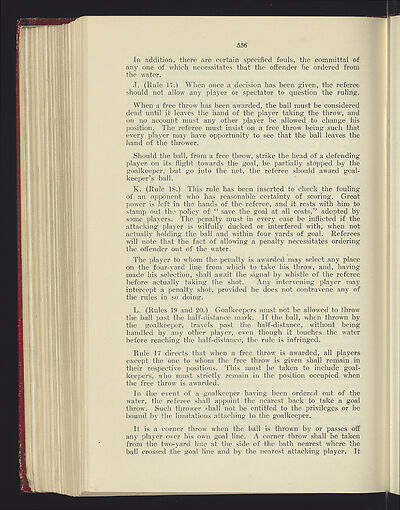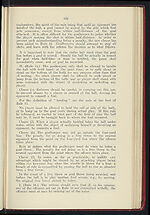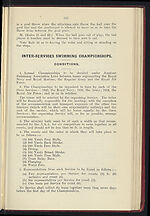1931
(574)
Download files
Complete book:
Individual page:
Thumbnail gallery: Grid view | List view

556
In addition, there are certain specified fouls, the committal of
any one of which necessitates that the offender be ordered from
the water.
.1. (Rule 17.) When once a decision has been given, the refereE
should not allow any player or spectator to question the ruling.
When a free throw has been awarded, the ball must be considered
dead until it leaves the hand of the player taking the throw, and
on no account must any other player be allowed to change his
position. The referee must insist on a free throw being such that
every player may have opportunity to see that the ball leaves the
hand of the thrower.
I
Should the ball, from a free throw, strike the head of a defending
player on its flight towards the goal, be partially stopped by the
goalkeeper, but go into the net, the referee should award goal-
li:eeper's ball.
h. (Rule IS.) This rule has been inserted to check the fouling
of an opponent who has reasonable certainty of scoring. Great
power is left in the hands of the referee, and it rests with him to
stamp out the policy of " save the goal at all costs," adopted by
some players. The penalty must in every case be inflicted if the
attacking player is wilfully ducked or interfered with, when not
actually holding the ball and within four yards of goal. Referees
will note that the fact of allowing a penalty necessitates ordering
the offender out of the water.
The player to whom the penalty is awarded may select any place
on the four-yard line from which to take his throw, and, having
made his selection, shall await the signal by whistle of the referee
before actually taking the shot. Any intervening player may
intercept a penalty shot, provided he does not contravene any of
the rules in so doing.
L. (Rules 19 and 20.) Goalkeepers must not be allowed to throw
the ball past the half-distance mark. If the ball, when thrown by
the goalkeeper, travels past the half-distance, without being
handled by any other player, even though it touches the water
before reaching the half-distance, the rule is infringed.
Rule 17 directs that when a free throw is awarded, all players
except the one to whom the free throw is given shall remain in
their respective positions. This must be taken to include goal-
keepers, who must strictly remain in the position occupied when
the free throw is awarded.
In the event of a goalkeeper having been ordered out of the
water, the referee shall appoint the nearest back to take . a goal
throw. Such thrower shall not be entitled to the privileges or be
bound by the limitations attaching to the goalkeeper.
It is a corner throw when the ball is thrown by or passes off
any player over his own goal line. A corner throw shall be taken
from the two-yard line at the side of the bath nearest where the
ball crossed the goal line and by the nearest attacking player. It
In addition, there are certain specified fouls, the committal of
any one of which necessitates that the offender be ordered from
the water.
.1. (Rule 17.) When once a decision has been given, the refereE
should not allow any player or spectator to question the ruling.
When a free throw has been awarded, the ball must be considered
dead until it leaves the hand of the player taking the throw, and
on no account must any other player be allowed to change his
position. The referee must insist on a free throw being such that
every player may have opportunity to see that the ball leaves the
hand of the thrower.
I
Should the ball, from a free throw, strike the head of a defending
player on its flight towards the goal, be partially stopped by the
goalkeeper, but go into the net, the referee should award goal-
li:eeper's ball.
h. (Rule IS.) This rule has been inserted to check the fouling
of an opponent who has reasonable certainty of scoring. Great
power is left in the hands of the referee, and it rests with him to
stamp out the policy of " save the goal at all costs," adopted by
some players. The penalty must in every case be inflicted if the
attacking player is wilfully ducked or interfered with, when not
actually holding the ball and within four yards of goal. Referees
will note that the fact of allowing a penalty necessitates ordering
the offender out of the water.
The player to whom the penalty is awarded may select any place
on the four-yard line from which to take his throw, and, having
made his selection, shall await the signal by whistle of the referee
before actually taking the shot. Any intervening player may
intercept a penalty shot, provided he does not contravene any of
the rules in so doing.
L. (Rules 19 and 20.) Goalkeepers must not be allowed to throw
the ball past the half-distance mark. If the ball, when thrown by
the goalkeeper, travels past the half-distance, without being
handled by any other player, even though it touches the water
before reaching the half-distance, the rule is infringed.
Rule 17 directs that when a free throw is awarded, all players
except the one to whom the free throw is given shall remain in
their respective positions. This must be taken to include goal-
keepers, who must strictly remain in the position occupied when
the free throw is awarded.
In the event of a goalkeeper having been ordered out of the
water, the referee shall appoint the nearest back to take . a goal
throw. Such thrower shall not be entitled to the privileges or be
bound by the limitations attaching to the goalkeeper.
It is a corner throw when the ball is thrown by or passes off
any player over his own goal line. A corner throw shall be taken
from the two-yard line at the side of the bath nearest where the
ball crossed the goal line and by the nearest attacking player. It
Set display mode to:
![]() Universal Viewer |
Universal Viewer | ![]() Mirador |
Large image | Transcription
Mirador |
Large image | Transcription
| Games and sports in the army > 1931 > (574) |
|---|
| Permanent URL | https://digital.nls.uk/248678837 |
|---|
| Description | 'Games and Sports in the Army' was an annual publication produced by the British War Office between the 1930s and 1960s. This included the Second World War. It outlines the rules and regulations for games and sports played by members of the armed forces. It features names and photographs of team members, and examples of contemporary advertising. |
|---|---|
| Shelfmark | GWB.52 |

